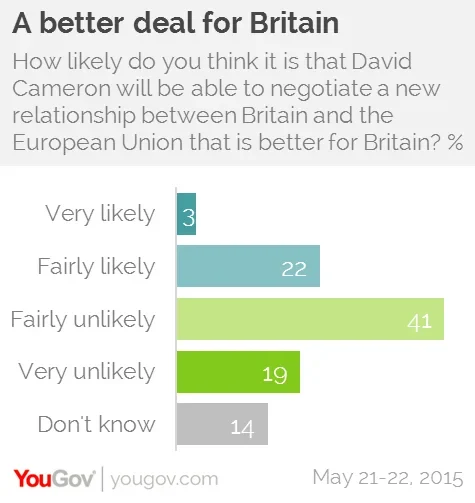Only one in four think the prime minister will secure reforms that are ‘better for Britain’, but voters back staying in the EU by 44% to 36%
Two weeks have passed since the election and David Cameron has set about to deliver on a key Conservative party campaign promise: getting a 'better deal' for the UK as part of the European Union and then holding a referendum on whether Britain should remain a member. The prime minister’s priorities include new powers for national governments to block EU legislation and the ability to restrict migrants’ access to benefits, but he is likely to face strong resistance from other European leaders.
Cameron also faces a sceptical public, according to a new YouGov poll for the Sunday Times. Asked whether he will be able to negotiate a new relationship between Britain and the EU that is “better for Britain”, 60% of respondents say it is unlikely to happen, including 19% who consider it very unlikely. Just 25% think Cameron will be able to secure a better deal. 14% don’t know either way.

While the findings don't demonstrate a great deal of confidence in the prime minister, low expectations might work in his favour if he wins any serious concessions from his European partners.
The referendum
Another point of controversy is the timing of the referendum. It is currently scheduled for 2017, but Cameron has refused to rule out moving it forward.
More than two thirds of voters (69%) prefer the vote come no later than 2017, including 38% who prefer it before 2017 and 31% who want to keep the existing timetable. Only 3% want a referendum later than 2017, while 14% say there should be no referendum during this Parliament.
The survey also finds there is currently more support than opposition to Britain staying a member of the EU. 44% say they woud vote “Yes” to membership if there were a referendum, against 36% who would vote "No" and another 20% who are undecided or wouldn’t vote.
The 8-point pro-EU lead is mostly consistent with recent YouGov surveys that have used a slightly different version of the EU referendum question.
PA image









